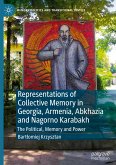This book seeks to advance a more systematic analysis of the relationship between collective memory and the economy. It addresses the fields of memory studies where economic aspects are underexplored, and of economic history/political economy, where few scholars take collective memory seriously. Contributions employ different concepts, approaches, and methodologies to the study of collective memory, and they address a variety of specific empirical aspects, brought together under the broad theme of economic crises and transformations in the nineteenth and twentieth centuries. Taken together, the contributions highlight the role of memory narratives for the political management of economic transformations, as well as their significance for longer-term social and cultural change.
Chapter 8 is available open access under a Creative Commons Non Commercial No Derivatives Attribution 4.0 International License via link.springer.com.
Chapter 8 is available open access under a Creative Commons Non Commercial No Derivatives Attribution 4.0 International License via link.springer.com.








